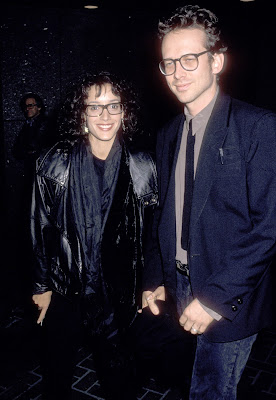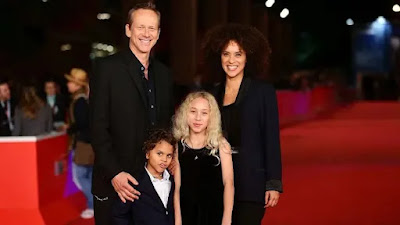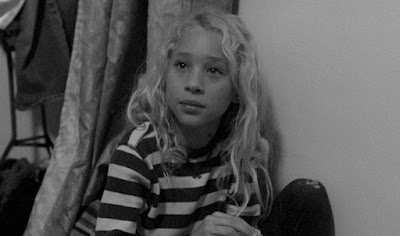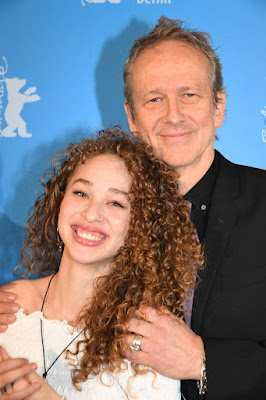 |
| Writer/director Annie Baker on the set |
 |
| Annie Baker with Elias Koteas |
 |
| Annie Baker with Sophie Okonedo |
JANET PLANET B+ USA Great Britain (113 mi) 2023 d: Annie Baker
Winner of a Pulitzer prize-winning play, The Flick, by Annie Baker, in 2014, and named a MacArthur Fellow in 2017, Baker is one of the preeminent voices of her generation while also a professor teaching playwriting in various institutions, including NYU, Barnard College, Hunter College, the University of Texas at Austin, and Stony Brook Southamption. Married to Nico Baumbach, younger brother of Noah, fictionally portrayed by Owen Kline in Noah’s autobiographical family portrait The Squid and the Whale (2005), currently a film theorist and professor at Columbia University, and part of the extended family of film director partners Noah Baumbach and Greta Gerwig, with Baker appearing briefly in Baumbach’s While We're Young (2014), her first film as a writer and director is unusual in that it appears to be told from the perspective of a quirky 11-year old child, Lacy (Zoe Ziegler, who has her own YouTube channel, Zoe._.Ziegler), a lonely, introverted, yet delightfully insightful daughter who has no real friends of her own, but has an extremely close relationship with her single mother Janet, an effectively understated Julianne Nicholson, most recently seen in Krystoffer Borgli’s Dream Scenario (2023). What sets this apart is not only the time period of 1991, when the director would have been the same childhood age, but more importantly the woodland setting outside Amherst, Massachusetts (where Baker was raised) known as the Happy Valley, a quiet and peaceful rural community known for its beautiful trees and wildlife, where it recalls that spacy West coast atmosphere of growing up in the 60’s, when alternative living was in vogue, like living off the land in communes. It’s rare for films to capture that unpretentious mentality so effortlessly, but this is one of the better mother/daughter films out there, as they actually talk and listen to one another, respecting what the other person has to say, strangely enough still sharing a bed together, remaining organically attached, with the director having a gift for extremely natural and realistic dialogue that is reminiscent of a Cassavetes film, complete with “likes,” “ums,” and plenty of weird pauses, where the hushed silences are full of meaning. They remain isolated from the outside world, living in their own private world where time passes slowly, Time Passes Slowly YouTube (2:36), a song that doesn’t actually play in the film, but it appropriately captures the time and space this film travels in, completely removed from the social media rampage and hurried pace of modern life. Baker’s plays are lessons of empathy, as she is a playwright who carefully listens to people, re-creating human speech with such delicacy that her characters feel startlingly familiar, as if we know these people. That is the beauty of this film, a study in mood and character, as it takes us places we’ve never been, having the luxury of spending time with people we never knew, yet they remind us not only of ourselves but those people around us. From the outset, we know this is operating on a different wavelength, with an unhurried, unconventional structure of scenes that rarely have a traditional beginning and end, but seem to exist midway between, often cutting off midstream or lingering long after they presumably end, utilizing a short script, shooting only 50 of the screenplay’s 70 pages, with a sound design that encapsulates the noises of nature, particularly frogs and crickets at night. Reflecting a lifestyle we probably tuned out years ago, this takes us back anyways, immersed in such a beautiful pastoral setting that allows us to simply spend time with these two characters who we become become intimately familiar with by the end, as if they are members of our own families. Drawing comparisons to the self-reflective cinema of Charlotte Wells’ 2023 Top Ten List #7 Aftersun or the magical realist world Céline Sciamma’s Petite Maman (2021), a compelling aspect of the film is that it takes us into the imagination of a child, where there are moments of adolescence that have not yet been articulated into words, but remain unspoken, a time of confusion and uncertainty, but also magic, with this film drawn to those inexplicable feelings of growing up, where we carefully observe the adults around us, trying to understand the mistakes they make, along with their sadness and pain.
Shot on 16mm by Swedish cinematographer Maria von Hausswolff, known for her work with Icelandic filmmaker Hlynur Pálmason, using oblique angles and unique compositions, this contemplative, low-budget indie film with lengthy takes subtly captures a hidden life we rarely have access to, drawing on fragments of dialogue, casual conversations, and a calculated use of reflective silences to focus on the quiet drama of everyday life, exploring how our environment and the people that inhabit it end up shaping us, yet perhaps the biggest surprise is that Janet talks to Lacy like an adult. Reminiscent of Anna Paquin’s candid relationship with Holly Hunter in Jane Campion’s The Piano (1993), this is a portrait of two lost souls coming together over a brief period of time, with Lacy having a rather possessive relationship with her mother, where all outsiders feel like interlopers. An atypical maternal figure, drawn to the counterculture hippie lifestyle, yet still feeling a bit lost, Janet seems to collect people, apparently attracted to damaged men she can take care of, appealing to her nurturing instincts, perhaps rooted in a difficult relationship with her Holocaust survivor father, while Lacy is influenced by the peripheral people she lets into her life, even spying on them, but it's never permanent. The only constant in Janet’s life is her daughter, as friendships come and go, but Janet and her daughter are two misfits bound together by trust and love, expressed with a refreshing lack of sentimentality. Lacy watches her mother intently, shown with remarkable detail and sensitivity as she practices Suzuki piano lessons on her miniature keyboard while also delving into imaginative worlds of her own creation, occasionally breaking out in humorously direct outbursts, like “You know what’s funny? Every moment of my life is hell,” while Janet is a healing acupuncturist who works out of their home, with the name Janet Planet appearing on the front door identifying her place of business. Lacy has little figurines that she arranges like an extended family on a small shelf, opening and closing a curtain, as if putting them to bed for the night, providing her immeasurable comfort, evoking similar scenes from Ingmar Bergman’s FANNY AND ALEXANDER (1982). Following other playwrights who have successfully made the transition to directing films, like Harold Pinter, Kenneth Lonergan, Martin McDonagh, Neil LaBute, Mike Leigh, David Mamet, John Patrick Shanley, or more recently Celine Song and Tina Satter, this film is told in chapter headings, where each chapter marks both a beginning and an end, like the changing seasons, reflecting people that wander in and out of their lives. First and foremost this is a quiet film, offering an experience of watching ordinary people doing ordinary things, where the surprises that come are reflected in how Lacy views what she sees, as both mother and daughter struggle with human connection. The first chapter is Janet’s current boyfriend Wayne (Will Patton), a Vietnam veteran with a troubled past. While he has a daughter, Sequoia (Edie Moon Kearns), that lives with her mother, Lacy enjoys playing with her, as we see them gleefully running around a shopping mall like an adventure playground, a happy and joyful experience, yet she’s endlessly curious why she doesn’t live with Wayne, a question he never answers, but seems to grow more and more irritated by the question, at one point succumbing to a migraine headache, where Lacy’s pestering questions touch a nerve, perturbed that she won’t leave the room when asked, growing so exasperated that he lunges at her, which is the last we see of Wayne. Janet asks her daughter what to do, and Lacy suggests that she break up with Wayne. As simple as that may be, what mothers actually take their 11-year old daughter’s advice? That, in itself, is a revelation, as is the music heard by Laurie Anderson, Laurie Anderson - My Eyes (Remastered) YouTube (5:28), an artist who sings about the randomness of our fates and the seeming insignificance of our place in the universe, asking existential questions about the choices people make.
The film takes a different turn in the next chapter entitled Regina, as the two of them visit an unusual performance troupe in a local farm commune that features life-size puppets (from an artist-run theater company, Double Edge Theatre Official Website), which takes us back in time, singing Elizabethan rounds and madrigals, including the melancholic Round and Round by Libana, YouTube (2:15), an a cappella women’s chorus, recalling the atmosphere of outdoor country fairs (like the Oregon Country Fair), with Janet recognizing one of the actresses as an old friend, Regina (Sophie Okonedo), who soon comes to live with them. While she’s black and speaks with a British accent, she has that same laid-back atmosphere of the 60’s, a soul searcher attempting to find meaning in her life, hoping a change will do her good, taking up Janet’s offer to literally rescue her from a group that she describes as cult-like, Janet Planet Exclusive Movie Clip - What's a Cult? YouTube (1:39). Despite their longtime friendship, and a few adventures with Lacy, Do lots of people fall in love with you? #JanetPlanet TikTok (1:07), Regina intrudes on their familiar space, getting high together with Janet and suddenly turns judgmental, stumbling into unwelcome psychic regions, Who’s to say? Annie Baker’s #JanetPlanet is now playing in ... TikTok (54 seconds), bringing a heavy sadness that suggests she’s still got her own issues to work out, with her ex-boyfriend, the theater group leader Avi (Elias Koteas), seen out the window picking her up and returning her back to the commune. That’s the lead-in to the third chapter, Avi, the bearded yet soft-spoken, spiritual guru from the commune, who’s much nicer than Janet was led to believe from Regina, surprisingly so, quickly growing closer together, where the biggest surprise is that he goes off on these off-kilter philosophical tangents that come out of nowhere, with both Janet and Lacy seemingly in awe and admiration, as if in a trance, but the hypnotic spell quickly wears off and he disappears back to the commune as well, leaving mother and daughter alone once again to reflect on their lives. With undercurrents of mysticism and spirituality, this is the kind of film that will completely alienate conventional viewers, lacking the patience to discover what lies beneath. An unusual coming-of-age film, going against the grain of child performances, Lacy’s communication style is very direct, something her mother calls “forthrightness,” nothing particularly off-putting, but it can be startling coming from a child who’s so openly curious, observant, and straightforward. Her mother, whose performance seems to evolve over time, has a speech late in the film that penetrates to the very soul, with Lacy remaining completely silent after asking if her mother would mind if she dated a girl, responding that she’s often thought she might be a lesbian due to her assertiveness, which might be too much for a man, yet remains judgment free (all the more impressive since it comes during the AIDS epidemic), while also confessing about her own cyclical series of constant ups and downs with revolving partners, wondering if that array of swirling emotions has screwed up her life (Baker’s own parents each married multiple times, which can be very destabilizing as a child, very infuriating), thoughts few mothers would ever consider sharing with their daughters, yet that’s essentially the heart of the film, as this young girl is trying to find her place in the world with a mother who doesn’t seem to have ever found her place. While there are sudden revelatory monologues, and a mystical presence that surrounds the story’s edges, the motivations of the characters are often left unexplained, yet each, in their own way, is searching for self-acceptance. One afternoon, during a bucolic picnic, Avi reads to Janet a section of Rilke’s Duino Elegies, Elegy IV by Rainer Maria Rilke - Famous poems, where afterwards he admits, “I really like you.” But she is more interested in the poem than the man, asking him to “Read it again.”
…
and when I feel
inclined to wait before the puppet stage, no,
rather to stare at it so intensely that in the end
to counter-balance my searching gaze, an angel
has to come as an actor, and begin manipulating
the lifeless bodies of the puppets to perform.
Angel and puppet! Now at last there is a play!
Then what we separate can come together by our
very presence. And only then the entire cycle
of our own life-seasons is revealed and set in motion.



































